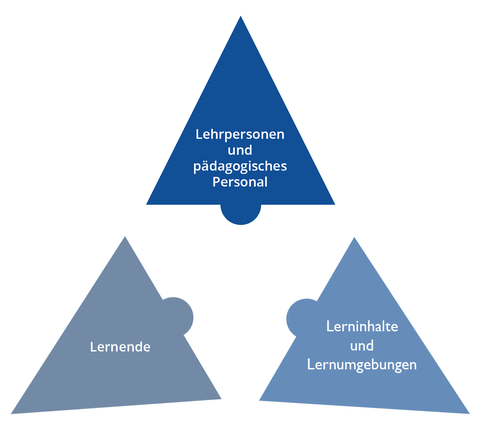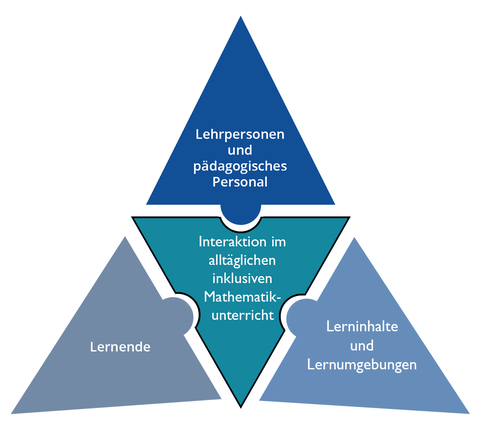Designing inclusive mathematics lessons at primary level
Table of contents
Abstract
The aim of our project is to combine mathematics didactics and inclusion didactics perspectives. Together with teachers and students, we aim to develop, implement and analyze ways of designing inclusive mathematics lessons. Building on and complementing existing mathematics didactics research approaches, the project will focus on the dialog and thus the interactions in mathematics lessons between the various stakeholders. Based on Feuser's developmental didactics, this is based on the assumption that learning takes place primarily in dialog - in cooperation with others on common topics and processes. These ideas are also in line with approaches of an interaction theory of mathematical learning developed in the tradition of Bauersfeld in mathematics didactics. According to these approaches, mathematics learning takes place at a young age in particular through increasingly autonomous participation in mathematical negotiation processes.
In order to focus on this basic approach of learning through interaction in the design of inclusive learning settings, an increased subject orientation is used to offer all pupils the opportunity to participate in the interaction on mathematical topics according to their abilities. The videotaped interactions during collaborative learning are analyzed for the development of teaching concepts and the training of students. This enables reflection on the opportunities and limitations of the learning environments developed. In particular, the qualitative analyses aim to reconstruct moments of successful professional and social participation of all children and to make the findings usable for teacher training.
Learn more
The topic of heterogeneity and inclusion - in addition to all the negative headlines that report excessive demands on teachers and the exclusion of learners - is currently associated with buzzwords such as opportunity, enrichment, potential and benefit in the pedagogical discourse. But where and how exactly do the opportunities and potentials of a heterogeneous student body become apparent in subject-related learning in the classroom? The aim of the project is to combine mathematics didactics and inclusion didactics perspectives and, together with teachers and students, to develop, implement and analyze design options for inclusive mathematics lessons in order to identify possible conditions for successful inclusive teaching. The qualitative analyses are primarily concerned with reconstructing moments of successful professional and social participation of all children and making the findings usable for teacher training.
With the increasing joint schooling of children with and without special educational needs at mainstream schools (cf. Autorengruppe Bildungsberichtserstattung 2018), a variety of mathematics didactic projects are now dealing with possible implementations of inclusive mathematics lessons. The research projects in the field of mathematics didactics can be roughly summarized into three categories based on their focus.
There are some research projects that focus on researching the experiences, attitudes and needs of mathematics teachers in inclusive
teaching and, building on this, develop concepts for teacher training and further education. Korff (2015), for example, found that, according to teachers, joint mathematics lessons are primarily achieved through action and material orientation and are particularly difficult to implement for more abstract content areas of mathematics, such as arithmetic.
A large number of projects deal with the development, testing and evaluation of concrete learning environments for joint mathematics learning (cf. Häsel-Weide & Nührenbörger 2015; Fetzer 2016; Scherer 2016; Korten 2017) and thus focus on learning content and its concrete implementation. This also includes the development and testing of work materials and the associated research into design elements in work assignments - for example the use of simple language and pictograms (cf. Noll, Roth & Scholz 2017). These studies are framed by general concepts on the basic principles of inclusive mathematics didactics (cf. e.g. Stöckli et al. 2014; Scherer 2015; Peter-Koop 2016).
The third current core research area focuses on the individual learner in inclusive mathematics lessons. The main focus here is on questions of appropriate support diagnostics (see, for example, Peter-Koop 2015: Support diagnostics in inclusive initial lessons) and dealing with specific impairments and their effects on mathematics learning (see, for example, Leuders 2016: Mathematics learning of children with visual impairments and blindness or Garrote, Moser Opitz & Ratz 2015: Mathematical skills of pupils with a focus on intellectual development).
Building on and complementing these research approaches, this project will focus on the dialog and thus the interaction between the various stakeholders in inclusive mathematics lessons.
Based on Feuser's developmental didactics (2011), this is based on the assumption that learning takes place primarily in dialog - in cooperation with others on common topics and processes. These ideas are also in line with the approaches of an interaction theory of mathematical learning developed in mathematics didactics (cf. Bauersfeld et al 1988). According to these approaches, mathematics learning takes place particularly at a young age through the increasingly autonomous participation in mathematical negotiation processes (cf. Krummheuer 1992). In order to focus on this basic approach of learning through interaction in the design of inclusive learning settings, an increased subject orientation is used to try to offer all pupils the opportunity to participate in the interaction about mathematical content according to their abilities.
From the perspective of interactionist approaches to interpretative teaching research (see Krummheuer & Najouk 1999, among others), the research logic attempts to describe mathematics learning under the conditions of inclusion and thereby demonstrate the potential for change in practice. This is also based on the fundamental understanding that inclusive learning conditions will have a significant influence on the interactive relationships between the teacher, the educational staff and the learners as well as between the learners themselves.


